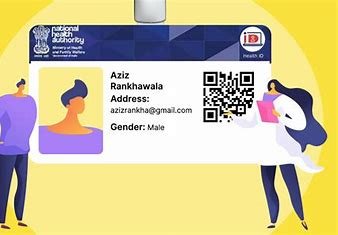In today’s digital age, managing healthcare data efficiently is essential for improving patient care and streamlining medical processes. A Health ID is transforming the way healthcare information is stored, accessed, and shared. Whether you’re looking to track your health journey, receive personalized treatments, or make healthcare processes more efficient, a Health ID can be a game changer. In this article, we’ll explore what a Health ID is, how it works, its key benefits, and why it’s the future of personal healthcare.
What is a Health ID?

A Health ID is a unique identification number or digital record that stores an individual’s health information. It consolidates all relevant data from hospitals, clinics, insurance providers, and pharmacies into one easy-to-access digital platform. By linking various medical records into one system, Health IDs provide both patients and healthcare professionals with a seamless way to manage health information.
Countries like India have implemented Health IDs as part of their digital health initiatives. For example, the National Health Authority introduced the Health ID system through the Ayushman Bharat Digital Mission, allowing individuals to store vital medical information such as diagnoses, prescriptions, test results, and vaccination records.
How Does a Health ID Work?
A Health ID works by securely gathering and storing your healthcare data in a central database. Here’s a breakdown of how it operates:
- Creating Your Health ID: You can easily create your Health ID online through a government website or health portal.
- Linking Medical Data: Once your Health ID is created, your medical records are linked from different healthcare providers (e.g., hospitals, clinics, pharmacies) into the digital system.
- Accessing Health Data: Healthcare providers and patients can access this data easily, ensuring that all medical history is available whenever needed.
- Data Security: Health ID systems utilize encryption and other robust security measures to protect personal health information from unauthorized access.
For more information about how digital health systems are evolving, check out this World Health Organization (WHO) report.
Key Benefits of a Health ID
Health IDs offer several advantages that enhance the healthcare experience for both patients and healthcare providers:
1. Streamlined Healthcare Access
With a Health ID, medical professionals can access a patient’s complete medical history in real time. This reduces the need for redundant tests and treatments, and ensures that doctors make informed decisions based on the most up-to-date information available.
2. Improved Patient Care
A Health ID allows doctors to quickly review your past diagnoses, lab results, allergies, and medications, leading to more accurate and personalized care. This reduces the likelihood of mistakes and improves overall treatment outcomes.
3. Enhanced Data Security
Health IDs use state-of-the-art encryption and security measures to keep your data safe. Unlike paper-based records, which can be lost or damaged, digital records are securely stored in cloud databases with restricted access, ensuring only authorized users can view them.
4. Convenience and Accessibility
No longer do you need to carry paper records or keep track of every medical detail. With a Health ID, your health data is always accessible, whether through a mobile app or an online portal. This is particularly useful when traveling or switching healthcare providers.
5. Cost-Effective Healthcare
By centralizing and digitizing health records, Health IDs help reduce administrative costs for healthcare institutions. This leads to more efficient processes and lower healthcare costs for patients.
For more on the benefits of health technology, read this Health Affairs study on digital health.
How to Create Your Health ID
Creating a Health ID is a straightforward process. Here are the steps to follow:
- Step 1: Register Online
Visit the official registration portal for your country or region. For example, in India, you can create your Health ID through the National Health Authority’s website. - Step 2: Provide Personal Information
Fill out the required details, including your name, date of birth, and contact information. You may also be asked to provide a government-issued ID number for verification. - Step 3: Link Your Medical Records
You can link your existing medical records from hospitals, clinics, or other healthcare providers to your Health ID. This makes it easier for healthcare professionals to access your full health history. - Step 4: Receive Your Health ID
Once your registration is complete, you will be assigned a unique Health ID. You can access it through a website or mobile app.
For a step-by-step guide on creating your Health ID, visit our how-to page.
Challenges and Concerns
While Health IDs offer numerous benefits, there are some challenges and concerns that must be addressed:
- Data Security and Privacy
Despite strong encryption, there are always concerns about the potential for data breaches. Ensuring personal health information is completely secure is vital for widespread adoption. - Digital Access
Access to the internet and digital tools remains a barrier for some populations, especially in rural or underdeveloped areas. Governments must ensure that digital health services are available to everyone. - Data Accuracy
The success of a Health ID depends on the accuracy and completeness of the data entered by healthcare providers. Inaccurate or incomplete medical records can negatively impact patient care. - Regulatory Oversight
Clear regulations are needed to ensure that Health ID systems are used ethically and responsibly. Governments must set standards to protect patients and healthcare providers.
Conclusion
A Health ID is an essential tool for improving the healthcare experience. By consolidating all your health information in one digital platform, it provides convenience, enhances patient care, and makes healthcare more cost-effective. While there are challenges, such as data privacy concerns and digital access issues, the potential of Health IDs to revolutionize personal healthcare is immense.
For more information on how Health IDs are shaping the future of healthcare, visit our Digital Health Technologies page.
External Links:
Internal Links:
Internal link:- healthnear


